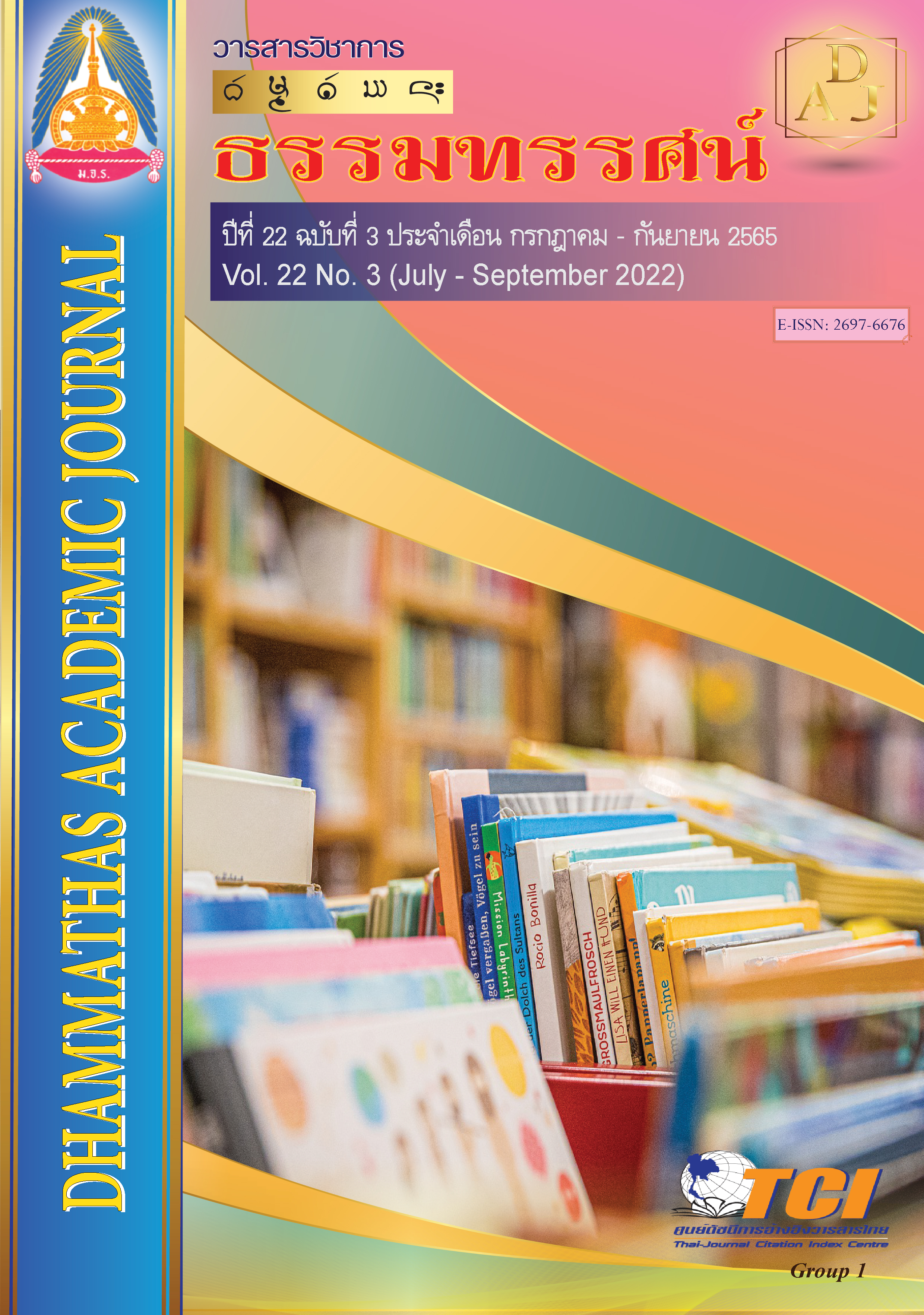The Development of an Innovative Care System for Students in Accordance With the Buddhist Principle of Primary Schools in Chiang Mai Province
Main Article Content
Abstract
The objectives of this research were: 1) to study the current condition of student care and assistance in primary schools in Chiang Mai Province, 2) to develop an innovative system to support students according to Buddhist principles, and 3) to propose an innovative system to support students according to Buddhist principles, using mixed method research. A questionnaire was used, a sample of 302 people, data were analyzed by statistical means, percentage, and standard deviation. An innovation was developed by interviewing 10 key informants and conducting a group discussion of 10 experts, data were analyzed by content analysis.
The results of the research found that:
1. The present condition of working to take care of students in primary schools in Chiang Mai in all 5 aspects, overall were at a high level, sorted in descending order is knowing the students individually, student promotion and development, student screening, student referral, preventing helping and correcting students.
2. The development of innovative student support system based on Buddhist principles for primary schools in Chiang Mai Province in all 5 aspects is knowing the students individually, student screening student promotion and development, preventing helping and correcting students, student referral Based on the four Brahma Vihara principles, teachers are compassionate, compassionate, Mutita, and Upekkha to students with individual student acquaintance activities, student screening activities, activities to promote and develop students, and preventive and remedial activities for students with a more quality student support system.
3. Innovation of student care system by integrating the Brahma Vihara principles, Metta, Karuna, Mutita, Upekkha, linked to the ICARE Model, i.e. I (Innovation), C (Care), A (Action), R (Report), E (Evaluation), consists of activities to promote the development of innovative student care systems. The school’s advisors were able to solve problems effectively.
Article Details

This work is licensed under a Creative Commons Attribution-NonCommercial-NoDerivatives 4.0 International License.
เพื่อให้เป็นไปตามกฎหมายลิขสิทธิ์ ผู้นิพนธ์ทุกท่านต้องลงลายมือชื่อในแบบฟอร์มใบมอบลิขสิทธิ์บทความ ให้แก่วารสารฯ พร้อมกับบทความต้นฉบับที่ได้แก้ไขครั้งสุดท้าย นอกจากนี้ ผู้นิพนธ์ทุกท่านต้องยืนยันว่าบทความ ต้นฉบับที่ส่งมาตีพิมพ์นั้น ได้ส่งมาตีพิมพ์เฉพาะในวารสาร วิชาการธรรม ทรรศน์ เพียงแห่งเดียวเท่านั้น หากมีการใช้ ภาพหรือตารางของผู้นิพนธ์อื่นที่ปรากฏในสิ่งตีพิมพ์อื่นมาแล้ว ผู้นิพนธ์ต้องขออนุญาตเจ้าของลิขสิทธิ์ก่อน พร้อมทั้ง แสดงหนังสือที่ได้รับการยินยอมต่อบรรณาธิการ ก่อนที่บทความจะได้รับการตีพิมพ์References
กรมสุขภาพจิต กระทรวงสาธารณสุข. (2552). คู่มือครูที่ปรึกษาระบบดูแลช่วยเหลือนักเรียน. กรุงเทพฯ: ยูเรนัสอิมเมจกรุ๊ป.
_______. (2560). คู่มือครูที่ปรึกษาระบบดูแลช่วยเหลือนักเรียน. กรุงเทพฯ: ยูเรนัสอิมเมจกรุ๊ป.
กระทรวงศึกษาธิการ. (2556). พระราชบัญญัติการศึกษาแห่งชาติ พ.ศ. 2544 ฉบับปรับปรุง ครั้งที่ 2 พ.ศ. 2545. กรุงเทพฯ: คุรุสภาลาดพร้าว.
พรชัย เจดามาน และคณะ. (2560). การพัฒนาการศึกษาภายใต้กรอบประเทศไทย 4.0 สู่ศตวรรษที่ 21. วารสารครุศาสตร์อุตสาหกรรม, 16(2), 199-206.
พัชราภรณ์ เดชสุภา. (2551). ปัญหาการดำเนินงานจัดระบบดูแลช่วยเหลือนักเรียนของครูโรงเรียนประถมศึกษา ในเขตอำเภอคลองหาด สังกัดสำนักงานเขตพื้นที่การศึกษาสระแก้ว เขต 1. (วิทยานิพนธ์การศึกษามหาบัณฑิต). ชลบุรี: มหาวิทยาลัยบูรพา.
มานพ บุญสมพงษ์. (2550). ปัญหาและแนวทางแก้ไขการดำเนินงานระบบดูแลช่วยเหลือนักเรียนในโรงเรียนมัธยมศึกษา สังกัดสำนักงานเขตพื้นที่จังหวัดตราด. (วิทยานิพนธ์ศึกษาศาสตรมหาบัณฑิต). ชลบุรี: มหาวิทยาลัยบูรพา.
ราชบัณฑิตยสถาน. (2554). พจนานุกรรม ฉบับราชบัณฑิตยสถาน พ.ศ. 2554. เข้าถึงได้จาก https://dictionary.orst.go.th/index.php
สุชา จันทร์เอม. (2544). วัยรุ่น. กรุงเทพฯ: อักษรบัณฑิต.
สุมาลี ทองงาม. (2555). การบริหารจัดการระบบดูแลช่วยเหลือนักเรียน โรงเรียนวัดโคนอน สำนักงานเขตภาษีเจริญ กรุงเทพมหานคร. (วิทยานิพนธ์พุทธศาสตรมหาบัณฑิต). พระนครศรีอยุธยา: มหาวิทยาลัยมหาจุฬาลงกรณราชวิทยาลัย.
อร่าม เสือเดช. (2549). คู่มือการดำเนินงานตามกระบวนการในระบบการดูแลช่วยเหลือนักเรียน โรงเรียนวัดช้างเผือก. (วิทยานิพนธ์การศึกษามหาบัณฑิต). กรุงเทพฯ: มหาวิทยาลัยศรีนครินทรวิโรฒ.
Krejcie, R. V. & Morgan, D. W. (1970). Determining Sample Size for Research Activities. Educational and Psychological Measurement, 30(3), 607-610.

